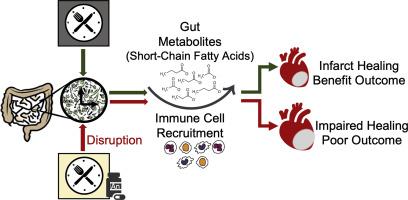Journal of Molecular and Cellular Cardiology ( IF 4.9 ) Pub Date : 2020-09-19 , DOI: 10.1016/j.yjmcc.2020.09.006 Priya Mistry 1 , Cristine J Reitz 1 , Tarak Nath Khatua 1 , Mina Rasouli 1 , Kaitlyn Oliphant 2 , Martin E Young 3 , Emma Allen-Vercoe 2 , Tami A Martino 1

|
Myocardial infarction (MI) leading to heart failure (HF) is a major cause of death worldwide. Previous studies revealed that the circadian system markedly impacts cardiac repair post-MI, and that light is an important environmental factor modulating the circadian influence over healing. Recent studies suggest that gut physiology also affects the circadian system, but how it contributes to cardiac repair post-MI and in HF is not well understood. To address this question, we first used a murine coronary artery ligation MI model to reveal that an intact gut microbiome is important for cardiac repair. Specifically, gut microbiome disruption impairs normal inflammatory responses in infarcted myocardium, elevates adverse cardiac gene biomarkers, and leads to worse HF outcomes. Conversely, reconstituting the microbiome post-MI in mice with prior gut microbiome disruption improves healing, consistent with the notion that normal gut physiology contributes to cardiac repair. To investigate a role for the circadian system, we initially utilized circadian mutant Clock∆19/∆19 mice, revealing that a functional circadian mechanism is necessary for gut microbiome benefits on post-MI cardiac repair and HF. Finally, we demonstrate that circadian-mediated gut responses that benefit cardiac repair can be conferred by time-restricted feeding, as wake time feeding of MI mice improves HF outcomes, but these benefits are not observed in MI mice fed during their sleep time. In summary, gut physiology is important for cardiac repair, and the circadian system influences the beneficial gut responses to improve post-MI and HF outcomes.
中文翻译:

昼夜节律对微生物组的影响可改善心力衰竭的结果。
导致心力衰竭(HF)的心肌梗塞(MI)是全世界死亡的主要原因。先前的研究表明,昼夜节律系统显着影响心肌梗死后的心脏修复,而光是调节昼夜节律对愈合影响的重要环境因素。最近的研究表明,肠道生理学也会影响昼夜节律系统,但它如何促进心肌梗死后和心力衰竭时的心脏修复尚不清楚。为了解决这个问题,我们首先使用小鼠冠状动脉结扎心肌梗死模型来揭示完整的肠道微生物组对于心脏修复很重要。具体来说,肠道微生物组破坏会损害梗塞心肌的正常炎症反应,升高不良心脏基因生物标志物,并导致更糟糕的心力衰竭结果。相反,在肠道微生物群受到破坏的小鼠中,在心肌梗死后重建微生物群可以改善愈合,这与正常肠道生理学有助于心脏修复的观点一致。为了研究昼夜节律系统的作用,我们最初使用了昼夜节律突变的Clock Δ19/Δ19小鼠,揭示了功能性昼夜节律机制对于肠道微生物组对 MI 后心脏修复和心力衰竭的益处是必要的。最后,我们证明,有利于心脏修复的昼夜节律介导的肠道反应可以通过时间限制喂养来实现,因为 MI 小鼠的清醒时间喂养可以改善心力衰竭的结果,但在睡眠时间喂养的 MI 小鼠中没有观察到这些益处。总之,肠道生理学对于心脏修复很重要,昼夜节律系统会影响有益的肠道反应,从而改善心肌梗死和心力衰竭后的结局。











































 京公网安备 11010802027423号
京公网安备 11010802027423号